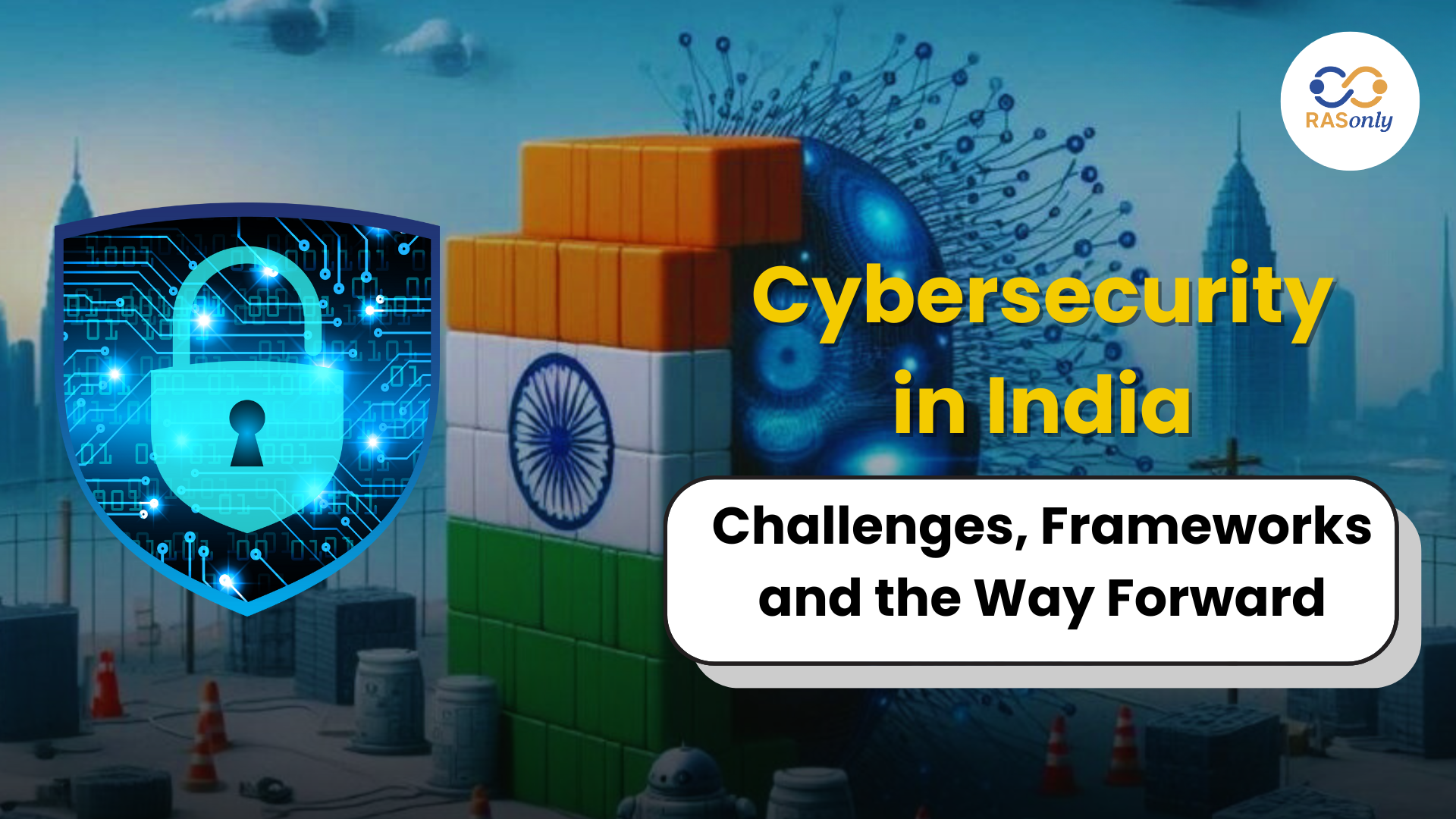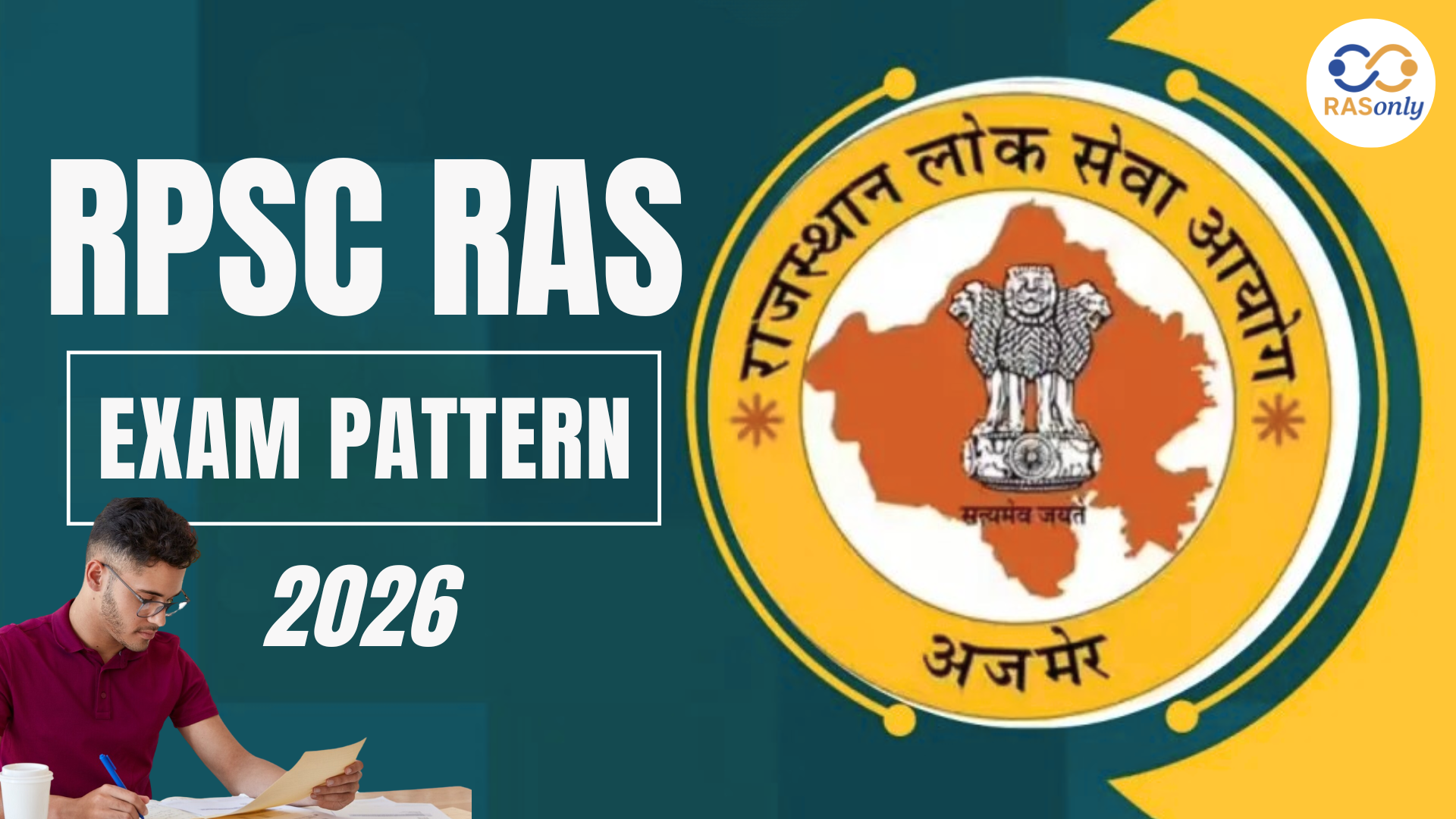RPSC RAS 2026 Subject Wise Exam Pattern for Prelims, Mains & Interview Details
- >
- RAS Preparation Resources
- >
- Cybersecurity in India: Challenges, Frameworks, and the Way Forward
Cybersecurity in India: Challenges, Frameworks, and the Way Forward

Get in Touch with RASonly!


Due to the speedy digitalisation of the world, cybersecurity has become a significant issue in the minds of the nations and India is not an exception. As a country with a huge internet population and a growing digital economy, India has been experiencing numerous cyber threats, including data breaches and ransomware attacks, yet cyber espionage and terrorism. The internet world is filled with over 759 million users in a country where digital security should be attained not as a technical requirement but as a business requirement.
A recent report by a non-profit organization PRAHAR has extrapolated that cyberattacks on India would swell to 1 trillion INR a year with 1 trillion INR not being an upper limit, all of this is by the year 2033 in the run-up to India achieving its centenary of independence in the year 2047. This threatening increase in Internet threats is quite dangerous to the growth and stability of India.
What is Cybersecurity?
- Cybersecurity means the security of the computer systems, networks, the information, and digital infrastructures against unauthorised access, attack, or harm.
- During this age of technology, it is an umbrella term covering protection of financial deals, fact and personal confidentiality, country secrets, and even utilities like electricity and transport networks.
Types of Cyber Threats
The following are ways in which cyber threats can be categorised:
- Cybercrime - Involves monetary fraud, the theft of identity, the attack of ransomware (such as WannaCry 2017).
- Cyber Espionage -Theft of secret data, e.g. the APT 10 gang assaulting Indian drug companies.
- Cyber Warfare - Actual Nation-state actors (i.e. infected with malware or denial-of-service).
- Cyberterrorism- Malevolence of vital services by terrorist organizations, as was the case in the Estonia cyberattack of 2007.
Importance of cybersecurity in India
The effort by India to achieve digitization in governance and economic reforms has made it even more dependent on cyberspace. This is how cybersecurity will be of prime significance to the country:
- Growing Digital Population: There are more than 700 million netizens in India and it provides the second largest online market in the world.
- Digital Economy Goal: In a bid to achieve the KPI, India aspires to be a 1 trillion digital economy.
- Critical Infrastructure Protection: The protection of power systems, banking and transport systems and defence systems against cyber attacks must be in place.
- Government Flagship Programs: The Digital India, Smart cities and BharatNet programs rely on secure and robust cyber infrastructure.
- Online Fraud and Phishing: On the one hand, e-commerce and information technology sectors are fast growing in India, which provide a source of export. On the other hand, online frauds and phishing attacks pose threats to Indian fast growing e-commerce and IT products and services.
- Cybercrime: The number of cybercrimes in India has increased by 500% in the last few years with the transnational attacks comprising the larger percentage.
Challenges in Cyber Security in India
However, even after improvement, India still bears a lot of issues concerning cybersecurity:
- Policy Gaps: With regard to operation clarity, the National Cyber Security Policy, 2013 is lacking. The IT Act, 2000 is obsolete and also insufficient to deal with current cybercrimes.
- Non-Integrated Institutional Framework: The coordination among agencies such as MeitY, NCIIPC, NCCC does not allow a proper response.
- Shortage of Workforce: The shortage of skilled people in cybersecurity is 70 percent in India.
- Digital Illiteracy: More than 80% of the Indian populace is ignorant of digital hygiene.
- Privacy and Data Breaches: There are common breaches (such as the Aadhaar data breach) that are of privacy concern.
- Foreign Technology Reliance: IT and Telecom equipment imports are more than 70% posing threat to security.
- Underreporting of Cyber Incidents: With just a few cybercrime cells and the little awareness among the population, most of the attacks are unreported.
- Transnational Nature of Threats: Approximately 75% of cyber attacks are launched by an outsider and this makes it hard to enforce the law.
Recently in the news
- On June 27, 2025, a Ministry of Women and Child Development issued a workshop on Cyber Security Awareness which was conducted to make the digital forums crops stronger and assure a hassle-free digital service in governance.
- This workshop aims at promoting the safety of children and women using the internet and combating cyber threats and will be spread to the field level.
Real Life Examples Which Indicate the Weakness of India
- AIIMS incident: Healthcare organizations have proved to be favorite targets of cyberattacks with the AIIMS incident being the testament and other attacks on other healthcare facilities.
- Kudankulam Nuclear Power Plant Attack (2019): An unsuccessful hacking of malware in one of the most guarded Indian facilities.
- City Union Bank SWIFT Hack (2020): Caused 2 million dollars to be moved unauthorised.
- CAT 2020 Data Breach: 190,000 students' data leaked on the net.
- RedEcho Malware (2021): Malware group which is a China-based targeted the power grid in India.
- SolarWinds Attack Impact (2020): Indian public sector institutes such as MeitY and the BHEL were among the affected.
Legal and Institutional Framework in India
Legal Provisions
- Information Technology Act, 2000: Regulates electronic dealings and electronic crimes.
- National Cyber Security Policy, 2013: The Framework of cyberspace security.
- Digital Personal Data Protection Act, 2023: establishment of user consent standards, data localisation and penalty on breaches.
Key Institutions
- CERT-In: Strikes back on the cyber threats and links responses to cyber-attacks simultaneously.
- National Cyber Coordination Centre (NCCC): Scans the internet traffic and determines real time threats.
- National Critical Information Infrastructure Protection Centre (NCIIPC): Shields the systems that are vital to national security.
- Cyber and Information Security (CIS) Division: Monitors and administers the actions against cybercrime.
- Defence Cyber Agency (DCyA): Deals with defence organs activities in cyber related operations.
- Indian cyber Crime coordination centre (I4C): Makes cyber crimes reporting and investigation easier.
Programs and Government initiatives
- Cyber Surakshit Bharat: It would also seek to establish capacity among IT officials in the government.
- Cyber Swachhta Kendra: It offers malware detectors and removers at no cost.
- Pradhan Mantri Gramin Digital Saksharta Abhiyan (PMGDISHA): Changes the level of digital literacy in the countryside.
- Digital Payment Security Framework: It is a proposed bill that should enhance financial cybersecurity.
- RBI Data Localisation Norms: Data must be stored in India.
Security and Intelligent systems
India has been observing a number of surveillance programs, yet they also present issues of privacy:
- Central Monitoring System (CMS)
- Network Traffic Analysis System (NETRA)
- NATGRID (National Intelligence Grid)
- Although such systems contribute to national security, it is vital to put in place some measures to avoid the abuse of such systems.
Way Forward: Fortifying the Cybersecurity in India
- Periodic Reformation of Cyber Laws: Both the IT Act and National Cyber Security Policy need to be reformed to counter emerging Cyber threats such as AI-based and deepfake attacks.
- Creation of a Centralised Cybersecurity Authority: There should be a nodal authority that will oversee the cybersecurity activities of each department and state.
- Build a competent workforce: Train cybersecurity specialists, the police, and the judges.
- Empower Indigenous Power: Allow Domestication of Make in India cybersecurity tools and software.
- Embrace Zero-Trust Architecture: Apply the principle of zero trust to lessen the risk of unknown digital demands by presuming all of them are untrusted.
- Increase Publicity: The nationwide advertisement must train people about phishing scams, data privacy, and digital hygiene.
- Encourage International Cooperation: Sign international treaties such as the Budapest Convention and take part in worldwide cyber exercise.
- Take Actions Immediately: Act on recommendations of some panels such as Rao Inderjit Singh panel and Gulshan Rai Panels.
Conclusion
Cybersecurity is no more a technical challenge but as a national interest that concerns law, policy, economy, and personal privacy. With India in the fast lane of becoming one of the global digital powermasters, its cyber infrastructure with its increasing levels and complexity of cyber threats has to go into high gear. With strong legislation, institutional changes, human resource and international collaboration, India will be in a position to provide its citizens a safe and stable cyberspace.
Post Category
- RAS Salary
- Result
- RAS Admit Card
- RAS Job
- RAS Cutoff
- Preparation Tips
- RAS Answer Key
- RAS Exam Analysis
- RAS Syllabus
- RAS Previous Year Papers
- RPSC RAS Exam Pattern
- RAS Interview
- RAS Mains Exam Date
- RAS Vacancy
- RAS Test Series
- RAS Best Books
- RAS Preparation Resources
- RAS Coaching Centre
- History
- Polity
- Geography
- Economics
- Science
- Art and Culture
- RPSC RAS Application Form
- RPSC RAS Notification
RASonly Interview Guidance Program

Mr. Ashok Jain
Ex-Chief Secretary Govt of Rajasthan
- IAS officer of the 1981 batch, Rajasthan cadre.
- Passionate about mentoring the next generation of RAS officers with real-world insights.
- Got retired in Dec 2017 from the post of Chief Secretary of the state of Rajasthan.

Mr. Guru Charan Rai
Ex-ASP / SP in Jaisalmer
- Guru Charan Rai, IPS (Retd), retired as Inspector General of Police (Security), Rajasthan, Jaipur in 2017.
- Served as ASP and SP in Jaisalmer, Nagaur, Sri Ganganagar, Sawai Madhopur, Dausa, Sikar, and Karauli.
- He also held key positions as DIGP and IGP in the Law and Order division.

Mr. Rakesh Verma
Ex-IAS Officer, B.Tech, MBA, and M.A. (Economics)
- IAS officer of the 1981 batch and retired in Chief Secretary Rank.
- Civil servant of high repute and vast experience.
- Has been teaching UPSC CSE subjects for the last six years.
Related Post
Daily Current Affairs for RAS Exam Preparation 2026

Rajasthan Pavilion Shines at Stone Mart Jaipur 2026
February 07, 2026
Rajasthan Achieves 3,000 MW Under PM-KUSUM Scheme
February 07, 2026
Gram Utthan Shivirs Strengthen Rural Governance in Rajasthan
February 07, 2026
Jaipur Badminton: 72-Minute U-15 Final Creates Record
February 06, 2026👉🏻 Register Today to Join Classes! 👍🏻
- Team RASOnly -
🎯 Benefits of RASOnly Coaching:
- ✅ 1:1 Mentorship with RAS Officers
- ✅ Experienced and Expert Faculty
- ✅ Free Library Access
- ✅ Daily Minimum 4 Hours Must
- ✅ Comprehensive Study Material
- ✅ Regular Tests & Performance Analysis
- ✅ Personalized Guidance & Doubt Solving
- ✅ Online & Offline Class Options
- ✅ Affordable Fees with Quality Education
Key Highlights:
- 👉🏻 3-Day Refund Policy
- 👉🏻 New Batch Starting from 04 August
- 👉🏻 Registration Amount: Only ₹1000









